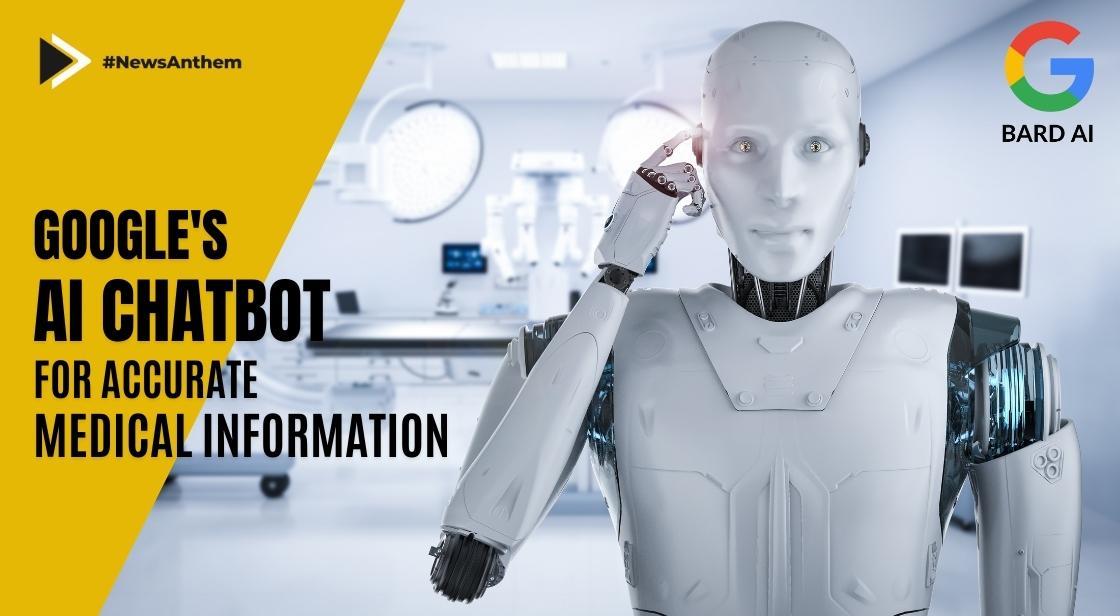Google Explores AI Chatbot for Expert Medical Information: Introducing Med-PaLM 2

News Synopsis
Google's AI Chatbot for Accurate Medical Information
Google is currently conducting tests on an artificial intelligence (AI) program called Med-PaLM 2, which is specifically designed to provide accurate medical information.
Med-PaLM 2, built upon the language model Bard, has been undergoing testing at the Mayo Clinic and other research hospitals since April.
Google aims to surpass general-purpose chatbots like Bard, Bing, and ChatGPT by training Med-PaLM 2 on a curated set of medical expert demonstrations.
Addressing Privacy Concerns with Med-PaLM 2
To address privacy concerns, Google ensures that users testing Med-PaLM 2 retain control over their encrypted data, with Google having no access to it. Greg Corrado, Senior Research Director at Google, acknowledges that Med-PaLM 2 is in its early stages.
While he wouldn't want it to be part of his family's healthcare journey, he believes it has the potential to significantly enhance healthcare experiences where AI can be beneficial.
Google's Commitment to Transparency and Privacy
Google recently updated its privacy policy, clarifying that publicly available data may be utilized to train its language models, with the term "AI models" replaced by "language models."
This change reflects Google's commitment to transparency in data usage and further emphasizes the company's dedication to protecting user data and privacy.
Advancing Access to Reliable Medical Information
The introduction of Med-PaLM 2 showcases Google's ongoing efforts to leverage AI technology and improve access to reliable medical information.
By developing a specialized chatbot focused on healthcare, Google aims to provide accurate and valuable medical insights to individuals in areas where access to medical resources is limited. The use of curated medical expert demonstrations ensures the chatbot's accuracy and reliability.
Potential for Revolutionizing Medical Information Access
As testing and development continue, Google's Med-PaLM 2 has the potential to revolutionize medical information access. By harnessing the power of AI, Google aims to enhance healthcare experiences and bridge the gap in areas with limited access to doctors.
The specialized chatbot holds promise for providing valuable medical insights and improving healthcare outcomes.
Conclusion
Google's exploration of the AI chatbot Med-PaLM 2 represents a significant step towards providing accurate and reliable medical information.
By focusing on healthcare-specific expertise and training the AI model on curated medical expert demonstrations, Google aims to surpass general-purpose chatbots and enhance healthcare experiences, particularly in areas with limited access to doctors.
Privacy and data security are paramount concerns in this endeavor, and Google ensures that users retain control over their encrypted data, highlighting its commitment to protecting user privacy.
The recent updates to Google's privacy policy further demonstrate the company's dedication to transparency in data usage.
With ongoing testing and development, Med-PaLM 2 has the potential to revolutionize medical information access and contribute to improved healthcare outcomes.
By leveraging AI technology, Google aims to bridge the gap in healthcare accessibility and empower individuals with accurate and valuable medical insights.
As Google continues to advance its AI capabilities and refine Med-PaLM 2, the chatbot holds promise for transforming the way individuals access and interact with medical information.
The introduction of this specialized chatbot reinforces Google's commitment to leveraging technology for the betterment of healthcare experiences while safeguarding user privacy and data security.